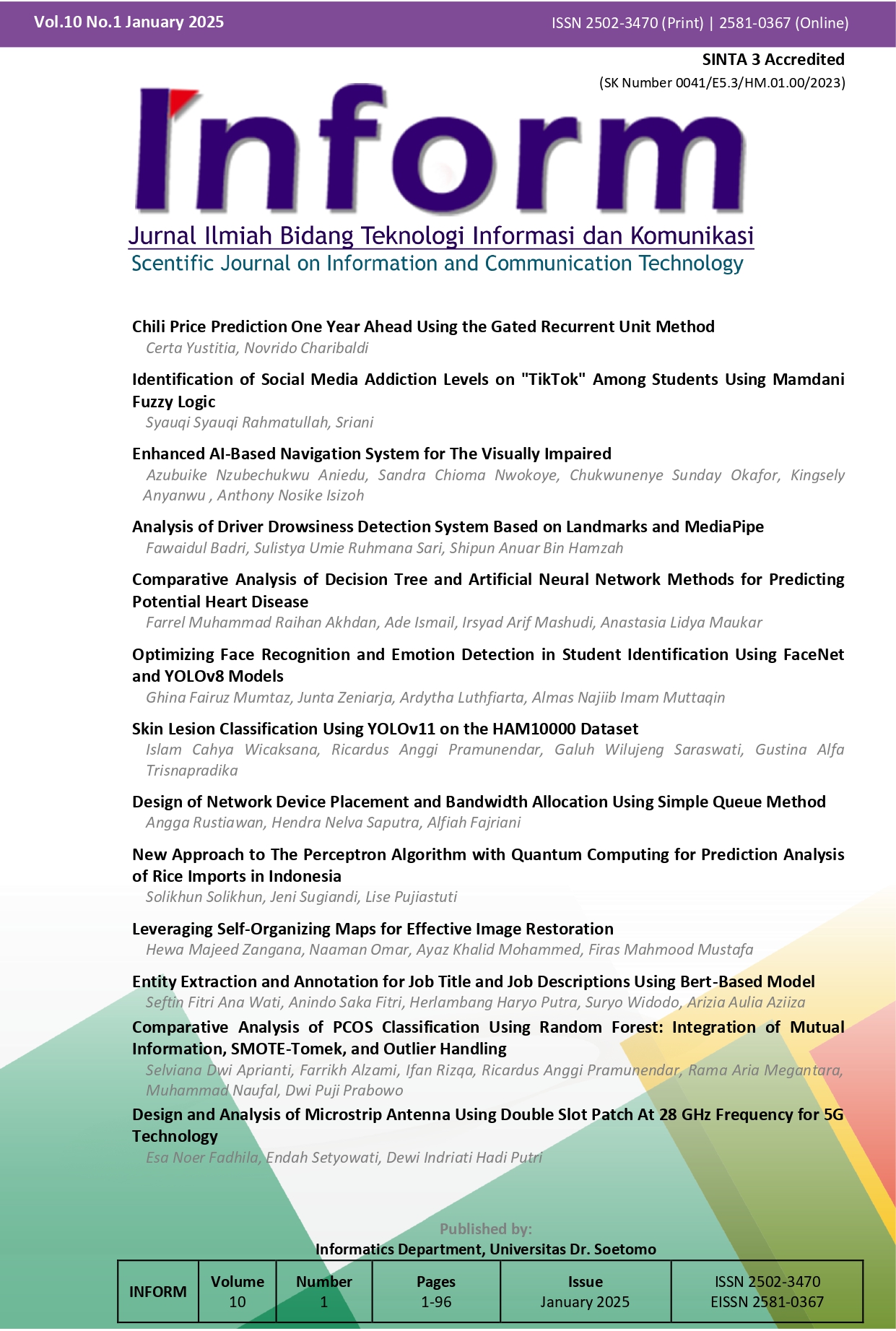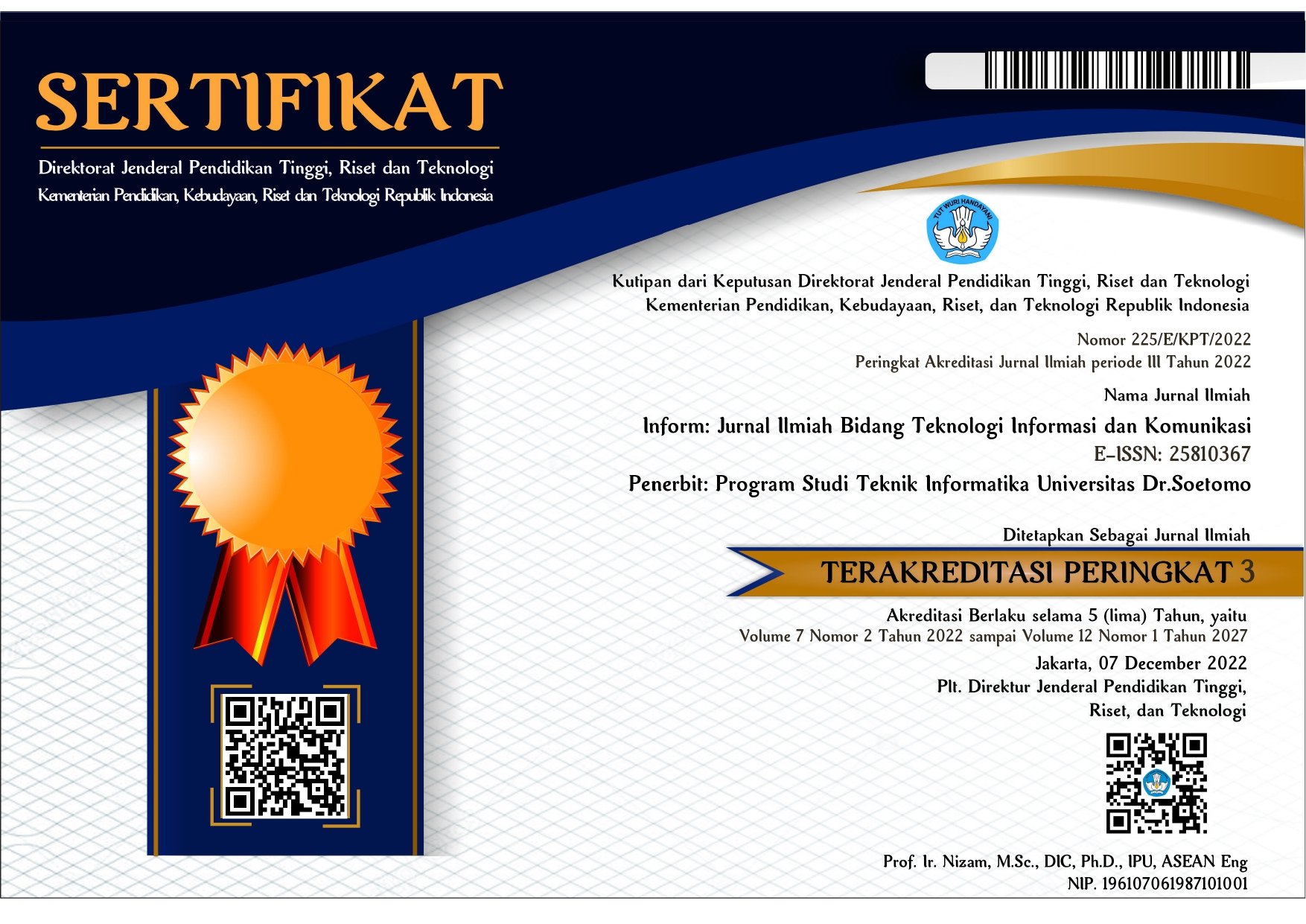Enhanced AI-Based Navigation System for The Visually Impaired
 Abstract views: 263
,
Abstract views: 263
,
 PDF downloads: 190
PDF downloads: 190
Abstract
This work introduces an Artificial intelligence (AI) based navigation system using the Raspberry Pi single-board computer. Its primary aim is to assist visually impaired users with precise navigation, achieved through machine learning algorithms for object detection. The development follows an agile methodology, emphasizing flexibility. The work explores integrating essential technologies into a system divided into two major subsystems: hardware and software. The hardware subsystem consists of a Raspberry Pi processor, a camera, an ultrasonic sensor, and a power source, collecting data on road conditions and traffic. The software employs TensorFlow and OpenCV to process data and provide optimized routes. The processed images were classified and identified using the YOLOv3 algorithm. The ultrasonic sensor could measure object distance with about 99.8% accuracy correctly. The test results demonstrate that the AI-based navigation system enhances user experiences and interaction with their environment by simplifying transportation and delivering accurate routes. It effectively analyzes and processes data obtained from the environment, improving accessibility for visually impaired individuals. The work concludes by discussing potential applications and future directions for AI-based navigation systems. It highlights the importance of affordable and accessible technology in improving transportation infrastructure, showcasing the potential for low-cost technology to enhance accessibility and mobility.
References
R.J.M.A.B.R.C.N.J.I.e.a. Burton MJ, "The Lancet Global Health Commission on Global Eye Health: Vision Beyond 2020," Lancet Glob Health, 2021.
Rohith Kumar, K. Sanjay, M. Praveen, "EchoGuide: Empowering the Visually Impaired with IoT-Enabled Smart Stick and Audio Navigation", 2023 2nd International Conference on Automation, Computing and Renewable Systems (ICACRS), pp.1770-1774, 2023.
R. R. Mahmood, D. M. Dherar, and E. A. Khalaf, "Real Time Object Detection for Visually Impaired Person," Annals of R.S.C.B., vol. 25, no. 4, pp. 14725-14732, 2021. DOI: https://doi.org/10.5573/ieiespc.2019.8.5.373
M. A. H. & F. B. Hanen Jabnoun, "Mobile Assistive Application for Blind People in Indoor Navigation, SpringerLink, 2021.
Likewin Thomas, Thara K L, Sunil Kumar H R, "Artificial Intelligence for Face recognition and Assistance for Visually Impaired", 2023 5th International Conference on Energy, Power and Environment: Towards Flexible Green Energy Technologies (ICEPE), pp.1-6, 2023.
R. Parvadhavardhni., P. Santoshi and A. M. Posonia, "Blind Navigation Support System using Raspberry Pi & YOLO," 2023 2nd International Conference on Applied Artificial Intelligence and Computing (ICAAIC), Salem, India, 2023, pp. 1323-1329, doi: 10.1109/ICAAIC56838.2023.10140484.
S. Duman, A. Elewi and Z. Yetgin, "Design and Implementation of an Embedded Real-Time System for Guiding Visually Impaired Individuals," 2019 International Artificial Intelligence and Data Processing Symposium (IDAP), Malatya, Turkey, 2019, pp. 1-5, doi: 10.1109/IDAP.2019.8875942.
R. Ivanov, "Indoor navigation system for visually impaired," in ACM International Conference Proceeding Series, vol. 471, pp. 143-149, 2010. DOI: 10.1145/1839379.1839405
S. Akila, S. Monal, A. Priyadharshini, M. Shyama, M. Saranya, et al., "Indoor and Outdoor Navigation Assistance System for Visually Impaired People Using YOLO Technology," International Research Journal of Engineering and Technology (IRJET), vol. 09, no. 05,, May 2022. e-ISSN: 2395-0056, p-ISSN: 2395-0072.
P. Yerlekar et al., "Artificial Vision for Visually Impaired using YOLO Detection," International Journal for Research in Applied Science & Engineering Technology (IJRASET), vol. 9, no. 5, pp. [Page Range], May 2021. ISSN: 2321-9653.
D. Tamilarasi, P. K. H. V, N. Manzar, P. P and M. Kumar, "Artificial Intelligence Vision For Visually Impaired," 2021 International Conference on Design Innovations for 3Cs Compute Communicate Control (ICDI3C), Bangalore, India, 2021, pp. 223-228, doi: 10.1109/ICDI3C53598.2021.00052.
R. Gatti, J. L. Avinash, N. Nataraja, G. R. Poornima, S. Santosh Kumar and K. Sunil Kumar, "Design and Implementation of Vision Module for Visually Impaired People," 2020 International Conference on Recent Trends on Electronics, Information, Communication & Technology (RTEICT), Bangalore, India, 2020, pp. 373-377, doi: 10.1109/RTEICT49044.2020.9315645.
S. Saha, F. H. Shakal, A. M. Saleque and J. J. Trisha, "Vision Maker: An Audio Visual And Navigation Aid For Visually Impaired Person," 2020 International Conference on Intelligent Engineering and Management (ICIEM), London, UK, 2020, pp. 266-271, doi: 10.1109/ICIEM48762.2020.9160169.
D. S. Kunapareddy, N. P. K. Putta, V. A. Maddala, R. K. Bethapudi and S. R. Vanga, "Smart Vision based Assistant for Visually Impaired," 2022 International Conference on Applied Artificial Intelligence and Computing (ICAAIC), Salem, India, 2022, pp. 1178-1184, doi: 10.1109/ICAAIC53929.2022.9792812.
T. M. Denizgez, O. Kamiloğlu, S. Kul and A. Sayar, "Guiding Visually Impaired People to Find an Object by Using Image to Speech over the Smart Phone Cameras," 2021 International Conference on INnovations in Intelligent SysTems and Applications (INISTA), Kocaeli, Turkey, 2021, pp. 1-5, doi: 10.1109/INISTA52262.2021.9548122.
Copyright (c) 2025 Azubuike Nzubechukwu Aniedu, Sandra Chioma Nwokoye, Chukwunenye Sunday Okafor , Kingsely Anyanwu , Anthony Nosike Isizoh

This work is licensed under a Creative Commons Attribution-ShareAlike 4.0 International License.
Authors who publish with Inform: Jurnal Ilmiah Bidang Teknologi Informasi dan Komunikasi agree to the following terms:
-
Authors retain copyright and grant the journal right of first publication with the work simultaneously licensed under a Creative Commons Attribution License (CC BY-SA 4.0) that allows others to share the work with an acknowledgment of the work's authorship and initial publication in this journal.
-
Authors are able to enter into separate, additional contractual arrangements for the non-exclusive distribution of the journal's published version of the work (e.g., post it to an institutional repository or publish it in a book), with an acknowledgment of its initial publication in this journal.
-
Authors are permitted and encouraged to post their work online (e.g., in institutional repositories or on their website) prior to and during the submission process, as it can lead to productive exchanges, as well as earlier and greater citation of published work.













